When we first started this “living full time in a motor home” adventure the home we moved into looked like this.

Not much would fit in it. We were able to sell or donate nearly everything we owned but how do you part with the photographs, legal papers, sentimental stuff, and irreplaceables? So we rented a storeroom for those things we just couldn’t part with. And some other stuff we could probably have parted with but as long as we had the storeroom anyway…
Several months later we moved into a slightly bigger RV.

More would fit but still not everything we owned.
Now we live in this one.
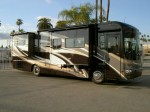
Can we, at last, put all our remaining stuff into our home and stop paying rent on a storeroom?
We started by selling the tire chains for the second RV to a friend who has a similar RV. Then we sent all the pieces parts for that RV, like hubcaps and privacy curtains, we found in the storeroom to the dealer who still has it on his lot.
We also spent most of the last month hauling stuff out of the storeroom bit by bit and trying to put it into our RV. Some of it got unpacked and put inside cupboards.
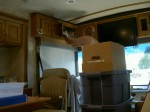
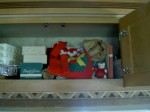
Some of it didn’t get unpacked but got put into cupboards.
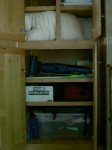

Some of it got put into the basement.
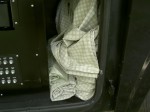
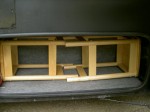
Yes, those are sheets I’m saving but more importantly, inside those sheets are my touch lamps: 3-way lights you turn on by just touching the lamps anywhere which is wonderful when you are awakened out of a sound sleep. And, yes, those are bar stools. But they have square tops instead of round ones which means they make good tables for holding up my touch lamps. I consider both of those things irreplaceable since I have never been able to buy any more in spite of having tried for years to do so.
So, we have not much more than this space still available.
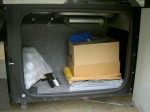

And this much stuff still in the storeroom.
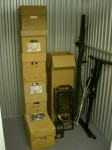
Are we going to make it?
I think so. It may take another round of donating and selling but I’ve always liked working puzzles so I think I can rearrange enough stuff to do this. We’re certainly not going to continue to pay to store the little bit that’s left.
Anyone want to buy a Progressive Industries 30 amp Power Management System or a Scangauge?
TTYL,
Linda













